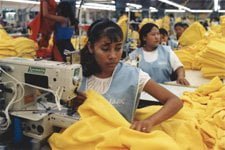[We received this piece from a young supporter of Socialist Appeal. It has generated a healthy debate. Socialist Appeal believes
that such exploitation is not a choice made
by ‘bad’, unethical capitalists, but an inevitable consequence of
capitalism itself. Competition for profits forces companies such as
Primark to source their products from low-wage economies such as
Bangladesh, and seek to force down the already meagre wages of their
employees. No amount of consumer ‘choice’, buying from ‘good’
capitalists, can change this. Only the working class of Britain,
Bangladesh and elsewhere, fighting together for better pay and
conditions and ultimately for socialism, can end this horror once and
for all. — Ed.]
For a lot of people looking fashionable is a must. They simply couldn’t
live any other way. It’s a given. Yet in a credit crunch you would
think that maintaining an up to date stylish look would be a burden and
would burn a hole in one’s pocket. Think again. Think Primark. Or what
avid fans like to call “Primani” (like Armani. It’s very witty).
Primark offers favourites from the catwalk and highbrow brands by
mimicking them, then selling the product for as cheap as chips. In some
cases, cheaper than chips.
At Primark you can buy a standard pair of jeans and t-shirt but also belts, shoes and accessories which replicate the expensive versions, costing hundreds of pounds more. Shoppers can look like the chosen celebrity they admire but not run up the same sort of tab. For many people it’s literally a dream come true. Also, despite its cheapness, people don’t mind mentioning it’s a Primark piece. It’s like they are getting away with something and admitting it. It’s become a cult thing. With 130 stores across the UK it is a big cult, granted.
The problem with Primark lies in the ugly reality behind the shiny stores and their cheap clothes. Made in sweatshop factories in Bangladesh, it is mainly women who sit for hours everyday stitching up next season’s mimic for very low pay. They work 80 hours a week at just 5p per hour. That is only £8 a month. Higher paid machinists receive up to £16. The average living wage in Bangladesh is a mere £22 a month so it is clear that the workers rights are being seriously abused. In 2006, in the space of just 2 months 100 workers were killed by the factories machinery. Either these workers are not trained properly or the machinery is extremely dodgy. Either way it is completely unacceptable. Primark has also been criticised for using child labour so it is no wonder why it has been rated the least ethical clothes shop in Britain. A disgusting state of affairs many of its customers, who now can look like Kate Moss and have a coffee for less than a tenner, simply do not know about.
So what can we do to stop this from happening, and can we buy clothes that don’t endorse poverty?
There are many on-line ethical clothes shops with a wide variety of fashion. The clothes are made and traded fairly and aren’t more expensive than many high-street stores. Clothes shops with an ethical policy for sourcing their products include People Tree, Hug and
Natural Collection.
Although some socialists, those who can afford to, choose to shop ethically in this way, you won’t have solved the problem of sweated labour. Ultimately we need to take control and write the contracts with the Bangladeshi workers. The textile workers need to be paid enough money to live on whilst the consumer still gets a good deal. Primark operate in the way they do because they can make such a huge profit. We need to own Primark in order to control what it does. That’s called nationalisation. It doesn’t look like Gordon Brown is going to do it but that’s what needs to happen.
Whether you shop at Primark or not you have the right to complain and tell them what you think. You can contact Primark about their labour policies at these web addresses:
– People and Planet’s Clean Up The Streets as part of their Trade Justice and Fairtrade Campaign
– Email The Secretary of State and call for legislation with War on Want
To learn more about the wicked world of fashion, the website www.nosweat.org.uk has a lot of useful information.






